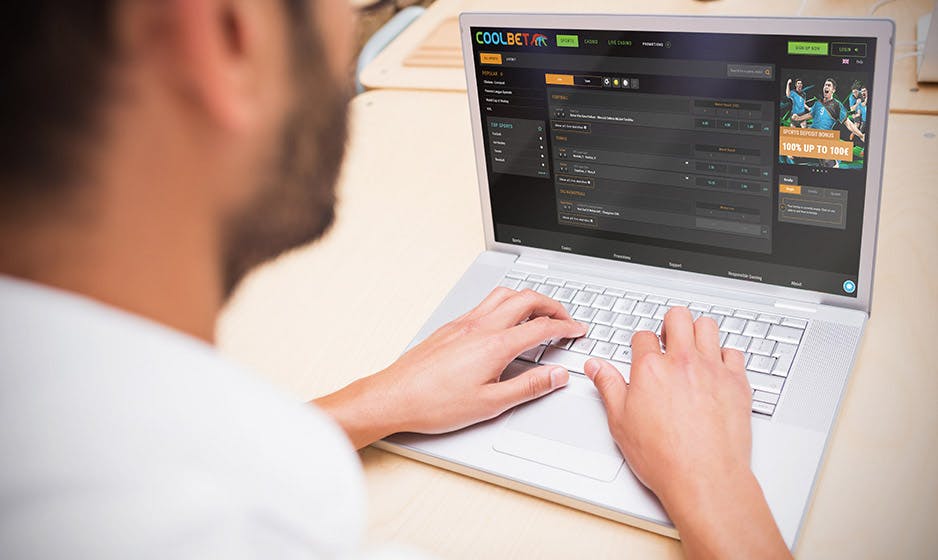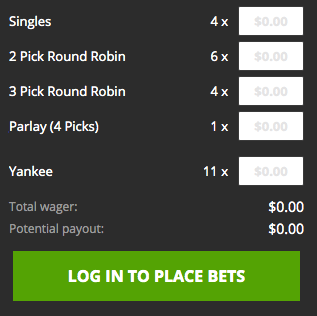How Does Sports Betting Payout Work
How To Read And Understand MoneyLine Betting Odds. First there are the moneyline betting odds, which is the bet on who will win the event outright with no point spreads or other variables.You. How does the sports betting app work Mobil Bahis test. Emu betting no deposit bonus. Bet now madrid socios. Wunderino Mobil Bahis bonus ohne einzahlung. Canlı bahis cruise near me. Mobilbahis party. How online betting works? How big of a bankroll should you have? Find out answers to these and many more questions in our sports betting FAQ. How Does Football Index Work? If one of your players wins one of these awards then you’re in for another dividend payout! BettingExpert welcomes all visitors by introducing itself as the social network of sports betting. Moreover, they offer monthly prizes worth £3,000 to the best 40 tipsters. Yet, that’s not the.
- How Does Sports Betting Payout Work Today
- How Does Moneyline Payout Work
- How Do Moneyline Payouts Work
Are you hoping to delve into the world of sports betting but confused where to begin?

With so much complex terminology, working out how and when to place a bet can feel like undertaking a degree in quantum mechanics.
However, in this super friendly beginners guide, we explain all, helping you become a pro in no time!
What is a Sports Bet?
A sports bet is a wager or gamble on the outcome of a sporting event. You typically need to be specific by predicting a certain outcome. For example betting on Wayne Rooney scoring a goal before half time or Germany beating France 1-0.
Sports bets consist of three key components: the selection, the stake and the odds.
The selection simply refers to what you are choosing to bet on.
The stake is the amount of money that you place on your bet, so if you choose to bet £10 then your stake is £10 – pretty simple!
The level of stakes can signify if a bet is particularly expensive or cheap. High-stake bets are those that involve a lot of money and low-stake bets are cheaper bets. Some bookmakers may also set a minimum or maximum stake.
Sports Betting Tips and Strategies
Of course there are numerous tips and strategies that you can use when sports betting. Here are a few that we recommend to beginners and seasoned players.
- Know your sport: Not only will your experience be more enjoyable but by choosing a sport that you know, you are much more likely to win as you have that existing knowledge. An example is football betting, any football fan knows that it is very unlikely that Stockport will suddenly win the Premier League but without that knowledge you could be setting yourself up for failure. We recommend sticking with what you know if you are a beginner.
- Choose your bet carefully: Consider what type of player you are, does the thought of risking a large amount of money make you feel ill? If so, then you may be better sticking with smaller odds on bets. Don’t be sucked in by promises of large wins, choose wisely and carefully.
- Start small: The absolute worst thing you can do as an amateur is to heavily invest into a bet that you are entirely uncertain of. Start with small stakes and low odds and get used to betting, then progress at your own pace.
- Try Accumulators: They may seem confusing, but if you are thirsting for a larger payout accumulators are a good way to minimise your risk and turn small bets into larger profits. Of course, no strategy is flawless and but accumulators can help you to steadily increase your payout.
- Consider a halftime bet: An advantage of a halftime bet is that you have seen the teams play in the first half so you have had the opportunity to assess the situation before placing your bet. Again, these types of bets are not wholly foolproof however, they can help you to offset losses or increase wins.
- Cash out wisely: The ‘cash out’ tool on many online sports betting sites can provide you with an advantage or disadvantage depending on how it is used. Cashing out early can reduce the overall profit you make however, if a game is going in your favour it can ensure that you take your profits early in case the game takes a sharp turn. Do some research and use the cash out tool wisely.
What are Odds?
Odds are the third and final component of a sports bet and have two purposes: to calculate the likelihood of the event happening and the potential monetary return on the wager placed.
Each time you place a bet you will be provided with odds that define how large your payout is – the higher the odds the more you can win.The greater the chance of an outcome happening, the lower the odds as you as are more likely to win.
Here’s an example to explain:
There’s a football match and you predict that John Stones of Manchester City will score three times before half time against FC Barcelona in the Champions League. As John Stones is a defender and Barcelona are a very good team, it is unlikely that this will happen, so the odds will be higher and the potential payout will be very high.
How do Odds Work?
To put it simply, bookmakers will take a bet and then create a formula. It is this formula that will determine how much money you will win based on the likelihood of your bet occurring.
Odds are based on probability and are usually expressed in a ratio of X to Y. The word ‘to’ is often replaced with a slash, hyphen or a colon so an example of an odd is 2/1. There are three types of odds based on how likely your outcome is these include: odds against, odds on and even odds.
Odds on: Odds on means that the event is more likely to occur than not, therefore the amount that you can win will be low. An example of an odds on bet is 1-2 (although this can also be expressed as “2-1 on”). This means that the event is twice as likely to happen.
To put it into perspective, you may place a £2 bet. If you win, your profit will be £1 plus your returned stake of £2 so your total payout will be £3. Note how technically you have profited however, your initial payout (ignoring the stake return) is lower than what you bet originally.
These type of odds tend to be offered for very likely outcomes also known as ‘favourites’.
Odds against: Odds against means the event is less likely to occur than not, therefore the potential payout is higher. An example of an odds against bet is 6-1 or “6-1 against”, this means that the amount you will win is more than the amount staked.
Assuming you placed a £1 bet with these odds and won, you would win £6 for every £1 bet. Odds against tend to be less favourable bets for example if you bet on an underdog.
Even odds: Evens or even odds occur when there is a 50-50 chance, so these tend to be bets when there are only two potential outcomes such as guessing head or tails on a coin flip. With these odds, if you win you double your original stake. An example of an even odd is 1-1, if you win, you win the same as your stake plus your original stake. If you bet £1 with this odd your total payout would be £2.


Odds Formats: Formats simply refer to the way that an odd is displayed. A change in format can be confusing if you are presented with a different format than what you are used to. The three formats for odds are known as: moneyline (or American odds), fractional and decimal.
Fractional: Fractional odds are when you are presented with two numbers as a fraction such as 11/2. If we were to bet £100 here and won, our payout would be £550.

Our stake is on the right hand side of the fraction as this is an odds against odd. We have bet £100 and £100 divided by 2 is £50 therefore we bet £50 twice. The 11 refers to how much the bookmaker would pay us times our original stake. So £50 times 11 would be £550.
The formula for fractional odds is stake(a/b) = payout, so using the example above this would be: 100(11/2) = 550.
Decimal: Decimal odds use decimal places instead of fractions such as 1.50. If we were to bet £100 and we won, our payout would be £150. Bear in mind that this includes our initial stake, so if you want to work out your profit simply minus one from the payout.
The formula for decimal odds is stake x odds = payout, so to use the example above it would be £100 x 1.50 = £150.
Moneyline: Moneyline odds are the most complicated odds as they can be positive (preceded by a plus sign) or negative (preceded by a minus sign). Positive moneyline odds show how much profit a winning bet will make, so if we bet £100 at moneyline odds of +300, our total profit would be £400.
The formula for positive moneyline odds is stake(odds/100) = profit, so for the above example our formula is £100(300/100) = £300. Note that this is only the profit, if we were to include our initial stake (which would be returned) our total return would be £400.
Negative moneyline odds work slightly differently as they show you how much you must bet to make a profit of £100. An example is -120 which means that a wager of £120 would win you £100. Similar to above, you would also get your stake back so your total return would be £220. If we bet £100 at moneyline odds of -200, our potential return would be £150. To work out the profit simply minus the stake, so our profit would be £50.
The formula for negative moneyline odds is stake/(odds/100) = profit, so for the above example our formula is £100/(-200/100) = 50. This is our profit, so to work out our total return we would add on the stake of £100 to get £150.
Sports Betting Dictionary
Within sports betting there are many terms that can be confusing if you don’t know what they mean. Here is a rundown of some of the phrases or terms that you may encounter. You can read more in our A-Z glossary of sports betting terms.
Accumulator (Acca) – Also known as an ‘acca’, an accumulator is a bet that links together two or more smaller bets. Accumulators are dependent on all of the bets winning however, they can quickly roll up smaller wins into one larger win.
Arbitrage Betting – A type of betting activity where a player places bets on all possible outcomes of an event at different bookmakers to ensure a win. These types of bets can also be referred to as “sure bets”, “miracle bets”, “arbs” or “sure wins”.
Bookmakers – The betting shop or online betting site that takes bets, calculates odds and pays winnings.
Closing Line – The final line of betting provided by bookmakers to players before an event begins.
Fixed Odds Betting – A traditional form of betting where a bookmaker offers odds on a specific outcome for an event. If the outcome occurs then the player will receive a payout, if the event does not occur a player will lose their stake.
In-play bet – Also known as a “live bet” or “in-running bet”, this is a bet that is offered by the bookmaker once an event has already started. These can be advantageous to players as they can assess the situation and then alter their original bet accordingly.
Moneyline – A format of odds that displays either how much profit a winning bet will make (positive) or how much a player must bet to make a profit of £100 (negative).
Odds – The ratio of stake to payout based on the likelihood of an outcome.

Over-under bet – A type of bet where a bookmaker predicts a statistic (for example two goals in one match) and players bet that the actual number will be higher or lower.
Payout – A player’s winnings.
How Does Sports Betting Payout Work Today
Potential Return – The potential payout that a player can receive from a bet, this includes the initial stake.
Sucker Bet – A type of bet where the investment is much higher than the potential payout.
Tipsters – People who are paid to provide information on the likely outcomes of sporting events.
Vigorish – Also known as “juice”, “under-juice”, “cut”, “take” or “vig”, this is the fee that a bookmaker charges to take a bet.
Wager – An alternative word for bet.
How Does Moneyline Payout Work
Why Should You Try Sports Betting?
How Do Moneyline Payouts Work
If you are a fan of sports, then sports betting can increase the excitement of a game and allow you to gamble without purely relying on chance. If you do plan on sports betting, we encourage all players to gamble responsibly.